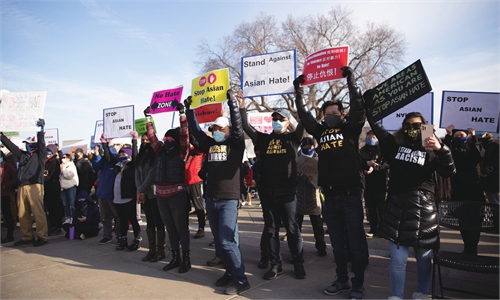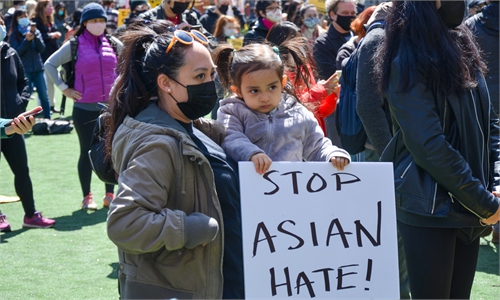From the end of 2020, incidents in the San Francisco Bay Area in which Asians have suffered personal and property security threats have been escalating. In result, the residential Asian community is taking actions for protection against Anti-Asian hate.
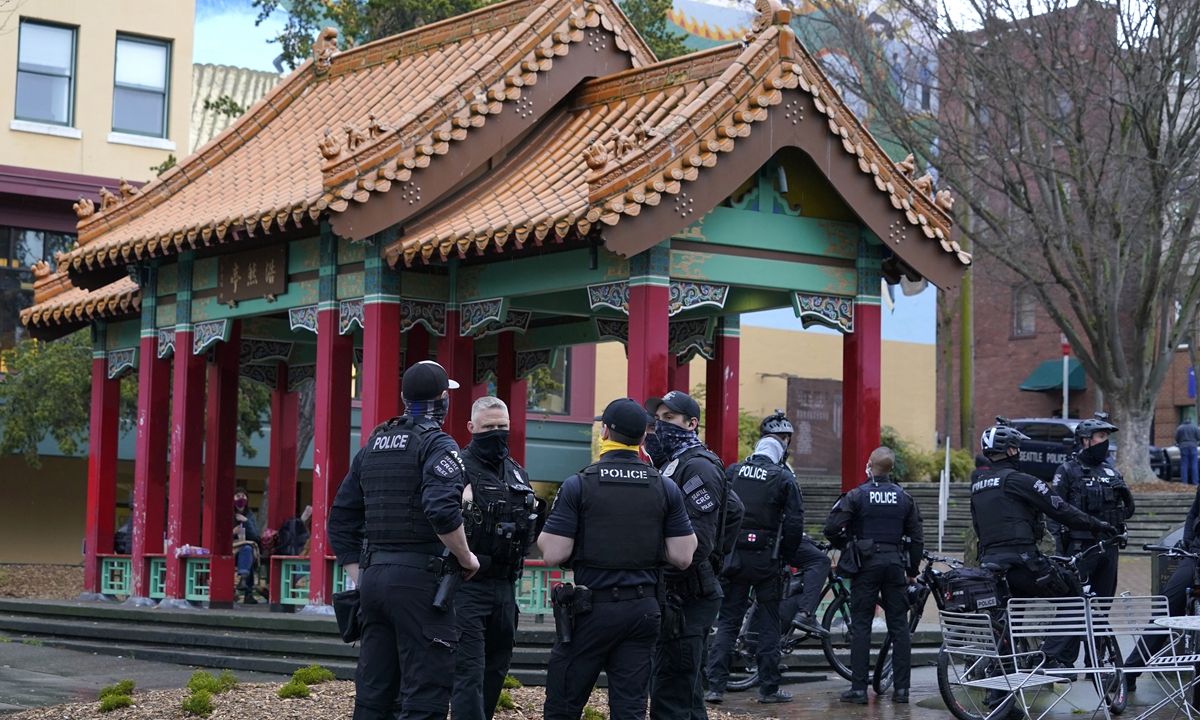
From the beginning, gangsters robbed shops and passersby in Chinatown. At the end of January, an African American youth suddenly began to push over innocent Asians in San Francisco and Oakland.
March was a dark month for Asians in the Bay Area and even across the US.
On March 14, a white woman insulted a Korean fashion blogger in Midtown Manhattan and told him to "Get the f**k back to China."
On March 16, three massage parlors in Atlanta were shot up, resulting in the deaths of eight Asians.
On March 17, an elderly lady, surnamed Xie, was attacked for no apparent reason by a white middle-aged male while setting up a street stall at a bustling intersection in San Francisco.
Her eyes were swollen and bleeding. The victim proceeded to take a wooden stick and strike back.
This series of frequent, racially and targeted vicious incidents made the Asian community concerned.
Finally, on March 27, a large-scale demonstration to stop Asian discrimination broke out in Union Square in downtown San Francisco. In the next few days, people in many other cities in the Bay Area also organized anti-Asian discrimination demonstrations.
Through interviews, the Global Times found that the scale and quality of most of the demonstrations, in effect, were not satisfactory.
According to a report on March 28 by Sing Tao Daily, some citizens were dissatisfied with not seeing any publicized reports about the protest on TV the day before the San Francisco protest, saying that TV stations should do their utmost to promote such an important event.
In the Oakland Chinatown Chamber of Commerce's WeChat group, there are also business owners sharing photos of local protests against racial discrimination, along with messages asking why so many Chinese residents in Auckland are hiding at home and not coming out to increase the momentum of the activity.
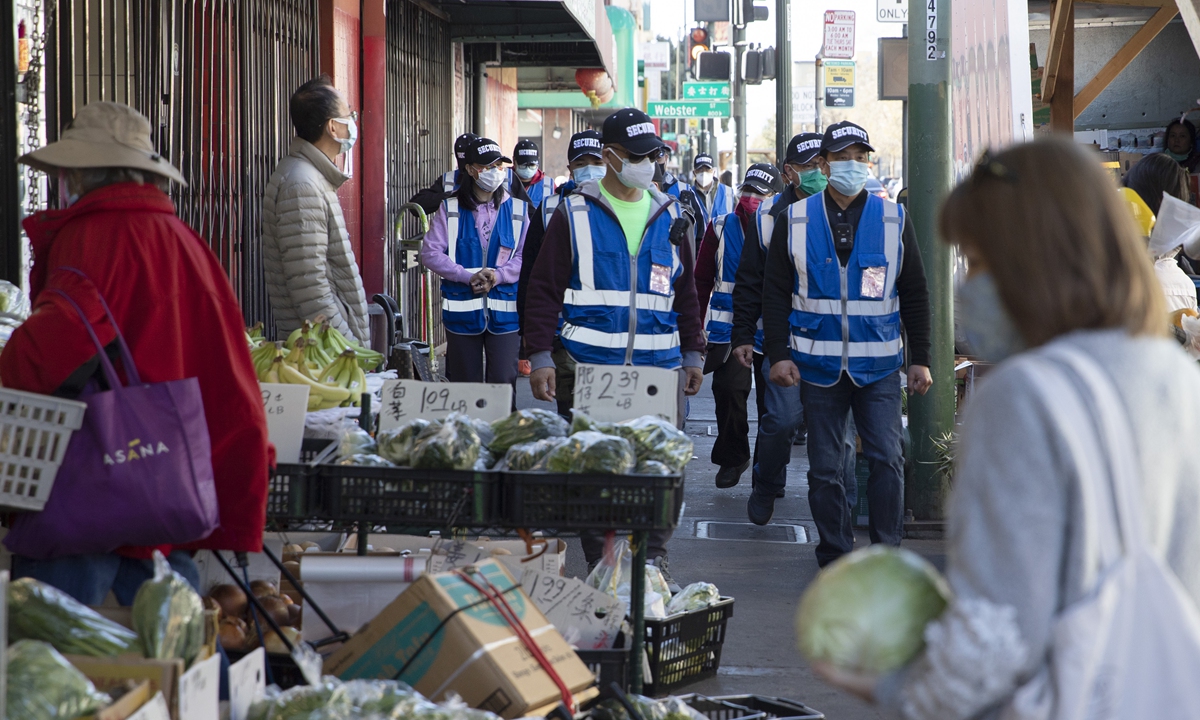
Chino Yang, one of the three North Americans who gained fame with the 2018 "New Rap in China" program, and the vice president of FJ in the Bay, is one of the initiators of anti-Asian discrimination activities.
He began writing songs to fight back since former US president Donald Trump called the coronavirus "China virus" or "Kung flu" in 2020.
Recently, a new song titled "Stand Up and Speak Up" was released after the anti-discrimination Asian demonstrations broke out across the US, encouraging Asians to unite and denounce racism.
In an interview with the Global Times, he said that he has observed that Chinese people are vulnerable to discrimination in the US for the past 20 years. There are six main reasons why they are susceptible to discrimination.
First, the Chinese have a high income in the US, but they are indifferent to other things except for education and making money, and do not get the respect of other races; second, the Chinese community is too scattered. Such communities include the old overseas Chinese, new overseas Chinese, 1.5-generation immigrants and foreign students.
Basically, no one pays attention to anyone. Third, the Chinese are labeled as "the model minority" by the white majority, thus dividing and conquering, making the Chinese unpopular.
Overseas Chinese are used to living in divided communities based on geographical factors. It is difficult to unite.
Being unwilling to share resources, overseas Chinese often dismantle against each other focusing on persistent infighting.
The Chinese community also does not have spiritual leaders and cannot unite other people.
Asians on the move
On the contrary, Asians in some other countries can unite and stay protected.
Yang admires the performance of "Asians with attitudes," a nonprofit organization with a background in Southeast Asia, in its anti-discrimination activities.
"They actively participate in protests and rallies and send members from various cities to San Francisco and Oakland's Chinatowns every day. They also organize patrols to protect local shops and pedestrians," Yang noted.
"Most members of 'Asians with attitudes' come from Laos, the Philippines, Cambodia, Myanmar, and other Southeast Asian countries. Many members have criminal records, but they have changed their mentality, reformed themselves, and have their full rights, and have their own occupations," he said.
When they saw that the outside world had become less "orderly" than the prison, they spontaneously set up this organization, with 10 branches across the country.
Yang pointed out, they do not have any political inclinations or interests, but are purely contributing to the community, and the average age of their members is under 40, showing an energetic spirit. He said he hopes that the older generation of Asian leaders from all walks of life will also be able to seed some ground. Cultivating young people, so that the younger generations with the same educational background and frames of reference can gradually be able to handle such problems by themselves. Abandon geographical restrictions, regardless of previous suspicions, and unite to fight against racial discrimination.
During a patrol in Oakland's Chinatown, Cambodian American Kevin, leader of "Asians with attitudes" the San Francisco Bay Area chapter said, "We are here to drive this chaos away, stop hatred and stop violence."
He elaborated that there are only three goals for the establishment of "Asians with Attitude": guarding the elderly, protecting community security, and promoting community construction.
He disclosed that he had been imprisoned for nine years, but now that time has passed, he is determined to protect the elders and future generations in the community, hoping that other citizens will support them with an equal perspective in the future to work together to fight racial discrimination and other hate crimes.
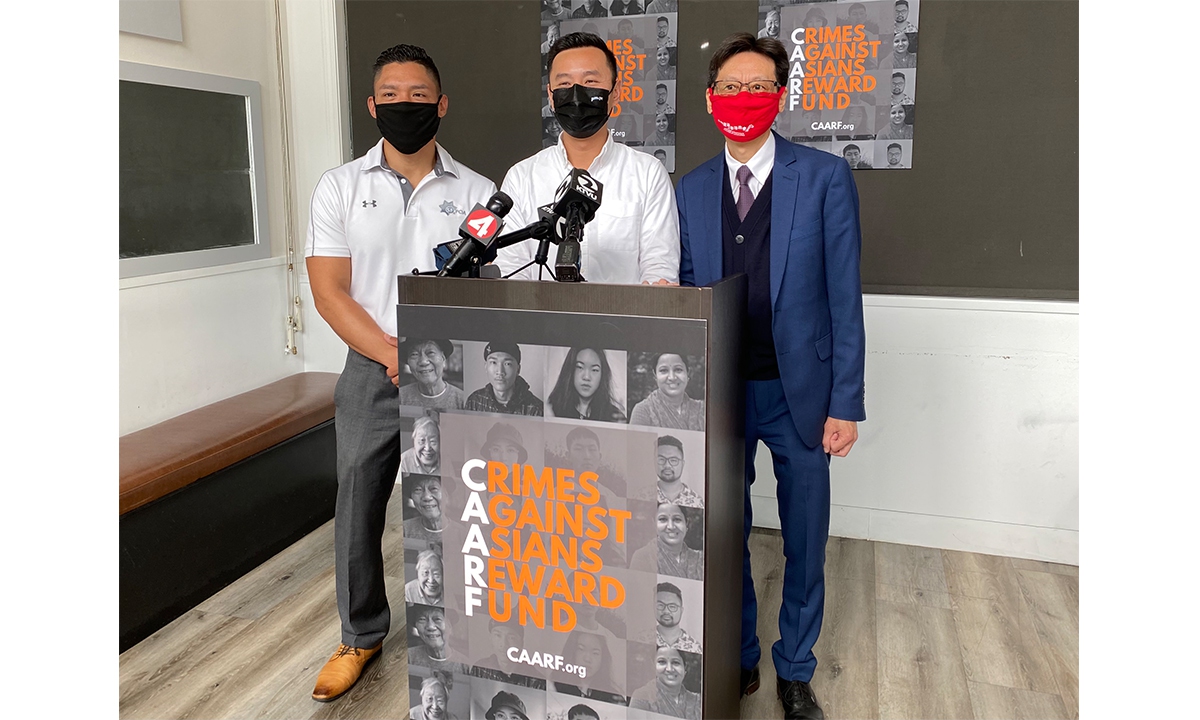
CAARF aims to solicit information that will help conclude investigations and ensure those providing tips are also protected.
The restaurant's chief operating officer, Vietnamese American Nghia Tran, said that "we can no longer stand by and remain silent about the harm in the community like in the past."
We have to join together and put resources together to pave the way for the next generation just like our ancestors.
The three founding units of the fund donated a total of $15,000 as start-up capital.
Meanwhile, a donation website, WWW.CAARF.ORG, was established to advocate for the whole society to donate to combat crimes that discriminate against Asians.
Carl Chen, president of the OCCC, said that this is a major shift from fragmentation to unity in the Asian community.
In the past, when incidents happened, shops complained a lot and acted far less. This time everyone came out with people and donated money to face problems together and promote the progress of the community, Chen pointed out.
Chinatowns in San Francisco and Oakland also set up volunteer patrols under the initiative of overseas Chinese leaders.
Joe Ma, the 75-year-old chairman of the East Bay Toishan Association, leads a volunteer team clad in red fluorescent vests on patrols for four hours a day.
"In addition to the Chinese, there are also Vietnamese and African Americans. It is for the safety of Chinatown to work together. The patrol team sent a whistle to each shop," he said,
Once a bad person is found, the shop will blow the whistle and warn the neighboring shops and patrol teams will immediately come to help and call the police.
According to a video posted by PBS NewsHour on YouTube on March 16, Japanese American Kazuko Hishida, an old resident of Oakland Chinatown, highly praised the patrol, "Their presence made me feel much safer. I experienced a major attack in February 2017. I also heard about the recent incidents. I can't bear any more."
Through many years of life in the US, Asian communities were often divided by the question "where did they come from." Or "where are your roots from?"
Those who are not from the same hometown or do not speak the same language tend to ignore each other, but they have experienced racial discrimination and violence in the past year.
After these hate crimes, everyone began to consciously reject Asian subdivision, and refuse to answer to questions about their respective ethnic identities, because everyone began to realize that we all have the same face, and name - "Asian."

Seattle Police officers confer after taking part in a public roll call at Hing Hay Park in the heart of Seattle's Chinatown-International District Thursday, March 18, 2021, at the start of their shift as part of a community response unit. Photo: VCG
EscalationFrom the beginning, gangsters robbed shops and passersby in Chinatown. At the end of January, an African American youth suddenly began to push over innocent Asians in San Francisco and Oakland.
March was a dark month for Asians in the Bay Area and even across the US.
On March 14, a white woman insulted a Korean fashion blogger in Midtown Manhattan and told him to "Get the f**k back to China."
On March 16, three massage parlors in Atlanta were shot up, resulting in the deaths of eight Asians.
On March 17, an elderly lady, surnamed Xie, was attacked for no apparent reason by a white middle-aged male while setting up a street stall at a bustling intersection in San Francisco.
Her eyes were swollen and bleeding. The victim proceeded to take a wooden stick and strike back.
This series of frequent, racially and targeted vicious incidents made the Asian community concerned.
Finally, on March 27, a large-scale demonstration to stop Asian discrimination broke out in Union Square in downtown San Francisco. In the next few days, people in many other cities in the Bay Area also organized anti-Asian discrimination demonstrations.
Through interviews, the Global Times found that the scale and quality of most of the demonstrations, in effect, were not satisfactory.
According to a report on March 28 by Sing Tao Daily, some citizens were dissatisfied with not seeing any publicized reports about the protest on TV the day before the San Francisco protest, saying that TV stations should do their utmost to promote such an important event.
In the Oakland Chinatown Chamber of Commerce's WeChat group, there are also business owners sharing photos of local protests against racial discrimination, along with messages asking why so many Chinese residents in Auckland are hiding at home and not coming out to increase the momentum of the activity.

A volunteer security team voluntarily formed by local Chinatown businesses and residents patrols Chinatown, in Oakland, California, the US, on March 6. Photo: VCG
Six factorsChino Yang, one of the three North Americans who gained fame with the 2018 "New Rap in China" program, and the vice president of FJ in the Bay, is one of the initiators of anti-Asian discrimination activities.
He began writing songs to fight back since former US president Donald Trump called the coronavirus "China virus" or "Kung flu" in 2020.
Recently, a new song titled "Stand Up and Speak Up" was released after the anti-discrimination Asian demonstrations broke out across the US, encouraging Asians to unite and denounce racism.
In an interview with the Global Times, he said that he has observed that Chinese people are vulnerable to discrimination in the US for the past 20 years. There are six main reasons why they are susceptible to discrimination.
First, the Chinese have a high income in the US, but they are indifferent to other things except for education and making money, and do not get the respect of other races; second, the Chinese community is too scattered. Such communities include the old overseas Chinese, new overseas Chinese, 1.5-generation immigrants and foreign students.
Basically, no one pays attention to anyone. Third, the Chinese are labeled as "the model minority" by the white majority, thus dividing and conquering, making the Chinese unpopular.
Overseas Chinese are used to living in divided communities based on geographical factors. It is difficult to unite.
Being unwilling to share resources, overseas Chinese often dismantle against each other focusing on persistent infighting.
The Chinese community also does not have spiritual leaders and cannot unite other people.
Asians on the move
On the contrary, Asians in some other countries can unite and stay protected.
Yang admires the performance of "Asians with attitudes," a nonprofit organization with a background in Southeast Asia, in its anti-discrimination activities.
"They actively participate in protests and rallies and send members from various cities to San Francisco and Oakland's Chinatowns every day. They also organize patrols to protect local shops and pedestrians," Yang noted.
"Most members of 'Asians with attitudes' come from Laos, the Philippines, Cambodia, Myanmar, and other Southeast Asian countries. Many members have criminal records, but they have changed their mentality, reformed themselves, and have their full rights, and have their own occupations," he said.
When they saw that the outside world had become less "orderly" than the prison, they spontaneously set up this organization, with 10 branches across the country.
Yang pointed out, they do not have any political inclinations or interests, but are purely contributing to the community, and the average age of their members is under 40, showing an energetic spirit. He said he hopes that the older generation of Asian leaders from all walks of life will also be able to seed some ground. Cultivating young people, so that the younger generations with the same educational background and frames of reference can gradually be able to handle such problems by themselves. Abandon geographical restrictions, regardless of previous suspicions, and unite to fight against racial discrimination.
During a patrol in Oakland's Chinatown, Cambodian American Kevin, leader of "Asians with attitudes" the San Francisco Bay Area chapter said, "We are here to drive this chaos away, stop hatred and stop violence."
He elaborated that there are only three goals for the establishment of "Asians with Attitude": guarding the elderly, protecting community security, and promoting community construction.
He disclosed that he had been imprisoned for nine years, but now that time has passed, he is determined to protect the elders and future generations in the community, hoping that other citizens will support them with an equal perspective in the future to work together to fight racial discrimination and other hate crimes.

On April 8, local time, the Burma Love and Superstars Restaurants held a press conference with the OCCC and the San Francisco Police Officers Association to announce the establishment of the Crimes Against Asians Reward Fund. Photo: Summer Li/GT
On April 8, local time, the Burma Love and Superstars Restaurants which has served in the Bay Area for more than 20 years held a press conference with the OCCC and the San Francisco Police Officers Association to announce the establishment of the Crimes Against Asians Reward Fund (CAARF) to fight racial injustice and crimes committed against Asian Americans and the Pacific Islander community in the Bay Area.CAARF aims to solicit information that will help conclude investigations and ensure those providing tips are also protected.
The restaurant's chief operating officer, Vietnamese American Nghia Tran, said that "we can no longer stand by and remain silent about the harm in the community like in the past."
We have to join together and put resources together to pave the way for the next generation just like our ancestors.
The three founding units of the fund donated a total of $15,000 as start-up capital.
Meanwhile, a donation website, WWW.CAARF.ORG, was established to advocate for the whole society to donate to combat crimes that discriminate against Asians.
Carl Chen, president of the OCCC, said that this is a major shift from fragmentation to unity in the Asian community.
In the past, when incidents happened, shops complained a lot and acted far less. This time everyone came out with people and donated money to face problems together and promote the progress of the community, Chen pointed out.
Chinatowns in San Francisco and Oakland also set up volunteer patrols under the initiative of overseas Chinese leaders.
Joe Ma, the 75-year-old chairman of the East Bay Toishan Association, leads a volunteer team clad in red fluorescent vests on patrols for four hours a day.
"In addition to the Chinese, there are also Vietnamese and African Americans. It is for the safety of Chinatown to work together. The patrol team sent a whistle to each shop," he said,
Once a bad person is found, the shop will blow the whistle and warn the neighboring shops and patrol teams will immediately come to help and call the police.
According to a video posted by PBS NewsHour on YouTube on March 16, Japanese American Kazuko Hishida, an old resident of Oakland Chinatown, highly praised the patrol, "Their presence made me feel much safer. I experienced a major attack in February 2017. I also heard about the recent incidents. I can't bear any more."
Through many years of life in the US, Asian communities were often divided by the question "where did they come from." Or "where are your roots from?"
Those who are not from the same hometown or do not speak the same language tend to ignore each other, but they have experienced racial discrimination and violence in the past year.
After these hate crimes, everyone began to consciously reject Asian subdivision, and refuse to answer to questions about their respective ethnic identities, because everyone began to realize that we all have the same face, and name - "Asian."
